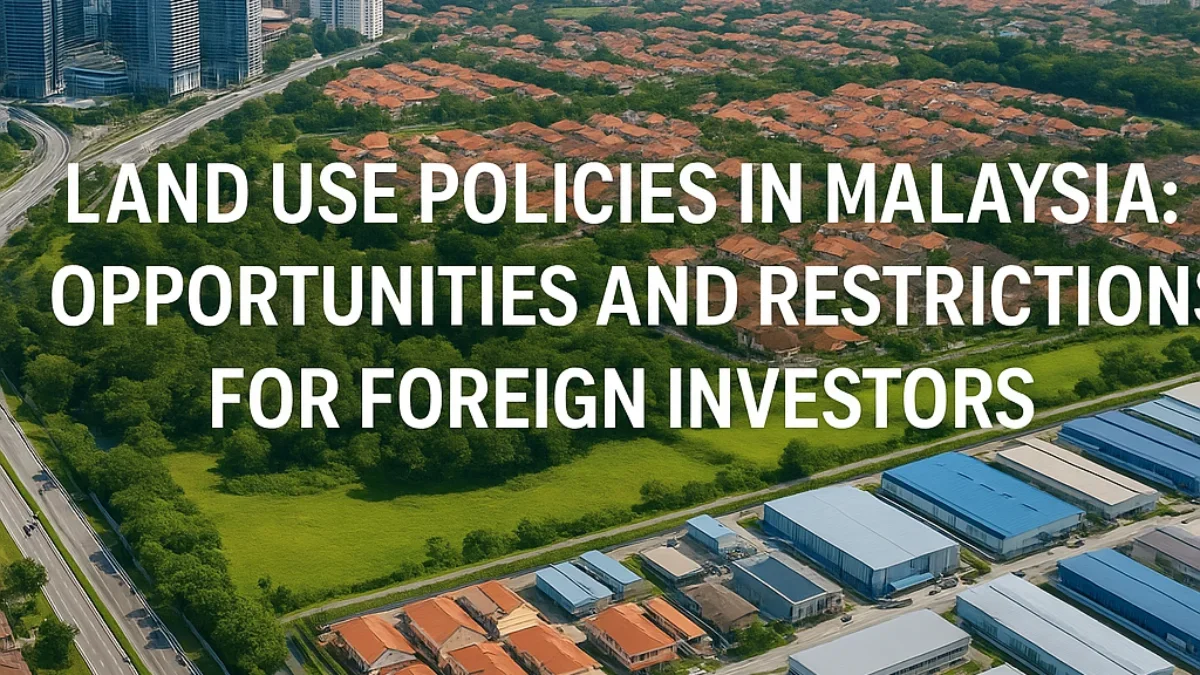Navigating Malaysian land laws can be complex for foreign investors. This comprehensive guide explains key policies, land ownership regulations, and usage restrictions to help you invest confidently and legally.
Introduction
Foreign investors are attracted to Malaysia’s growing economy, strategic location, and vibrant property market. However, investing in Malaysian land requires a clear understanding of land use policies, restrictions, and opportunities. This blog provides essential insights into Malaysian land laws for foreign investors.
Overview of Malaysian Land Use Policies
Malaysia has structured land use into several categories:
-
Residential
-
Commercial
-
Industrial
-
Agricultural
Understanding these classifications is crucial for foreign investors to ensure compliance and successful investment planning.
Types of Land Ownership Available to Foreign Investors
Foreigners can own land in Malaysia under specific conditions, including:
-
Freehold: Permanent ownership, transferable and inheritable.
-
Leasehold: Limited tenure, typically 99 years, subject to renewal.
-
Strata Titles: Usually for condominiums and apartments, offering foreign investors an easier entry.
Restrictions on Foreign Ownership
Foreign investors face several restrictions, primarily concerning:
-
Minimum Price Threshold: Each state has minimum property price requirements for foreigners.
-
Malay Reserved Land (Tanah Rizab Melayu): Restricted exclusively to Malays and cannot be sold or transferred to non-Malays.
-
Agricultural Land: Requires special permission from state authorities and often comes with strict limitations.
Opportunities for Foreign Investors
Despite restrictions, Malaysia offers substantial investment opportunities:
-
Commercial Properties: Shopping malls, office spaces, hotels.
-
Industrial Parks: Particularly in areas like Selangor, Johor, Penang.
-
Luxury Residential Developments: Condominiums, landed properties, and high-end serviced residences in major cities.
Steps for Foreign Investors to Acquire Land
-
Identify suitable land based on permitted categories.
-
Verify state-specific minimum investment thresholds.
-
Engage a local legal advisor for compliance.
-
Secure necessary state authority approvals (Land Office or State Economic Planning Unit).
-
Complete the acquisition process, including registration and stamp duty payments.
Key Challenges and How to Overcome Them
Common challenges include bureaucratic delays, unclear land titles, and changing regulations. To overcome these:
-
Conduct thorough due diligence.
-
Engage experienced local professionals.
-
Stay updated with changing land laws and state-specific rules.
Recent Developments and Trends
Malaysia is progressively simplifying procedures and improving transparency. Initiatives like digital land title verification, streamlined approval processes, and proactive foreign investment policies create a more attractive investment landscape.
Conclusion
Navigating Malaysian land use policies requires diligence and local expertise. With a strategic approach and a clear understanding of ownership restrictions and opportunities, foreign investors can successfully leverage Malaysia’s vibrant land and property market.
Contact us Call Kenneth 017-380 9993 Or WhatsApp our team directly for the latest availability



